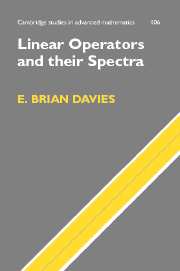Book contents
- Frontmatter
- Contents
- Preface
- 1 Elementary operator theory
- 2 Function spaces
- 3 Fourier transforms and bases
- 4 Intermediate operator theory
- 5 Operators on Hilbert space
- 6 One-parameter semigroups
- 7 Special classes of semigroup
- 8 Resolvents and generators
- 9 Quantitative bounds on operators
- 10 Quantitative bounds on semigroups
- 11 Perturbation theory
- 12 Markov chains and graphs
- 13 Positive semigroups
- 14 NSA Schrödinger operators
- References
- Index
8 - Resolvents and generators
Published online by Cambridge University Press: 08 January 2010
- Frontmatter
- Contents
- Preface
- 1 Elementary operator theory
- 2 Function spaces
- 3 Fourier transforms and bases
- 4 Intermediate operator theory
- 5 Operators on Hilbert space
- 6 One-parameter semigroups
- 7 Special classes of semigroup
- 8 Resolvents and generators
- 9 Quantitative bounds on operators
- 10 Quantitative bounds on semigroups
- 11 Perturbation theory
- 12 Markov chains and graphs
- 13 Positive semigroups
- 14 NSA Schrödinger operators
- References
- Index
Summary
Elementary properties of resolvents
In the last two chapters we introduced the notion of a one-parameter semigroup Tt and defined its infinitesimal generator Z. In this chapter we complete the triangle drawn on page 168 by studying the resolvent family of Z. We use the resolvents to describe the relationship between the spectrum of Z and of the semigroup operators Tt, and also to determine which unbounded operators Z are in fact the generators of one-parameter semigroups.
Resolvent operators are particularly useful in the analysis of Sturm-Liouville operators, because in that case one can write down their integral kernels in closed form; a very simple example is written down in Example 5.6.10. In higher dimensions this is not the case, and there is the added problem that their integral kernels are singular on the diagonal. Nevertheless resolvent operators play an important theoretical role, particularly in the analysis of perturbations.
We start by studying general unbounded operators. Just as in the bounded case, the spectrum and resolvent play key roles. In some ways the resolvent operators are more fundamental, because the spectrum of an unbounded operator can be empty. We will see that the resolvent norms provide important information about many non-self-adjoint operators. This is made explicit in the study of pseudospectra in Section 9.1, but the same issue arises throughout the book.
We review some earlier definitions. Let Z be a closed linear operator with domain Dom(Z) and range Ran(Z) in a Banach space B. A subspace D of Dom(Z) is called a core if Z is the closure of its restriction to D.
Information
- Type
- Chapter
- Information
- Linear Operators and their Spectra , pp. 210 - 244Publisher: Cambridge University PressPrint publication year: 2007
